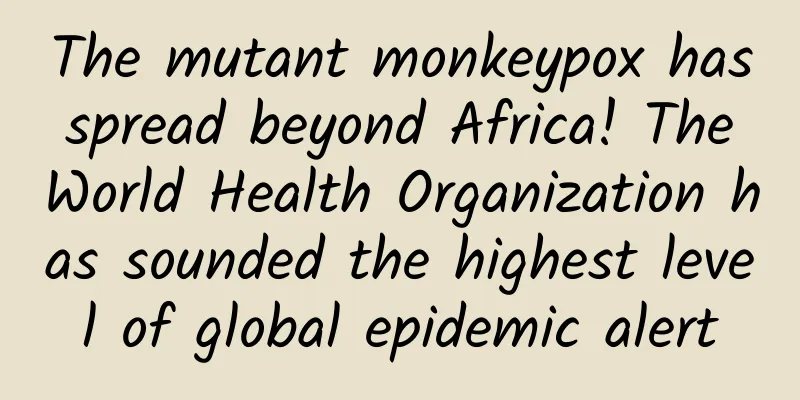The mutant monkeypox has spread beyond Africa! The World Health Organization has sounded the highest level of global epidemic alert

|
According to CCTV News World Health Organization Director-General Tedros Adhanom Ghebreyesus announced on the 14th Monkeypox outbreak composition “Public Health Emergency of International Concern” This is the first time that WHO has Second declaration of monkeypox outbreak “Public Health Emergency of International Concern” It is understood that this is also the highest level of global epidemic alert under the framework of the International Health Regulations. According to WHO data, the number of monkeypox cases reported so far this year has exceeded 15,600 , exceeding the total number of cases last year , with 537 deaths. Monkeypox outbreak rages across Africa On August 13, the Africa Centers for Disease Control and Prevention declared the monkeypox epidemic a public health emergency in Africa and called on African countries to take urgent action to prevent the continued spread of the monkeypox epidemic on the African continent. Data from the Africa Centers for Disease Control and Prevention on August 8 showed that at least 16 countries in Africa were affected by the monkeypox epidemic; compared with the same period in 2023, the number of monkeypox cases reported in Africa this year has increased by 160%. The acting director of the Swedish Public Health Agency announced on Thursday that they had confirmed the first case of type Ib monkeypox infection in a patient who had sought medical care in Stockholm. The Ib variant is a more contagious and deadly monkeypox virus. This is the first confirmed case of type Ib infection outside the African continent since the outbreak of this round of monkeypox, and it also shows that the monkeypox epidemic has begun to spread to other continents. The General Administration of Customs issued an announcement On August 15, the General Administration of Customs issued an announcement to prevent the spread of monkeypox into my country. For people from countries (regions) where monkeypox outbreaks occur, if they have been in contact with monkeypox cases or have symptoms such as fever, headache, back pain, myalgia, swollen lymph nodes, rash and mucosal rash, they should actively report to the customs upon entry. Customs personnel will take medical measures and conduct sampling and testing in accordance with the prescribed procedures. For transportation vehicles, containers, goods and articles from countries (regions) where monkeypox outbreaks occur and are contaminated or may be contaminated, sanitary treatment should be carried out in accordance with the prescribed procedures. The content of this announcement will take effect from the date of publication and will be valid for 6 months. During this period, the countries and regions where monkeypox outbreaks have been newly announced by the World Health Organization will be implemented in accordance with this announcement. 357 cases of monkeypox infection reported in China this year The national epidemic situation overview of statutory infectious diseases released by the National Center for Disease Control and Prevention shows that since 2024, a total of 357 cases of monkeypox have been reported in China, with no deaths, including 97 cases in January, 70 cases in February, 51 cases in March, 39 cases in April, 49 cases in May, and 51 cases in June. Why is the highest level alert issued again? The WHO said that the new strain of monkeypox virus "branch Ib" appeared in the Democratic Republic of the Congo last year and spread rapidly. It has spread to neighboring countries such as Burundi, Kenya, Rwanda and Uganda, which have never reported cases of monkeypox. This is one of the main reasons for declaring that the monkeypox epidemic once again constitutes an "international public health emergency." Tedros said that the current monkeypox epidemic has the potential to spread further in Africa and to other continents, which is very worrying. According to WHO data, more than 15,600 cases of monkeypox have been reported so far this year, exceeding the total number of cases last year, with 537 deaths. On the 13th, the Africa Centers for Disease Control and Prevention declared the monkeypox epidemic a public health emergency in Africa and called on African countries to take urgent action to prevent the continued spread of the monkeypox epidemic on the African continent. Data released by the Africa Centers for Disease Control and Prevention on the 8th showed that at least 16 countries in Africa are currently affected by the monkeypox epidemic; compared with the same period in 2023, the number of monkeypox cases reported in Africa this year has increased by 160%. What’s different about this round of epidemic The British journal Nature reported that in some cases of infection, researchers detected the main strain that caused the global monkeypox epidemic in 2022, the "branch II" strain. However, in recent months, the proportion of "branch I" strains in reported cases of infection has gradually increased. Over the past few decades, the "branch I" strain has caused several small-scale transmissions in Central Africa, usually limited to a few families or communities. According to the report, in April this year, researchers analyzed samples collected in South Kivu Province, Democratic Republic of the Congo from the end of last year to the beginning of this year, and found a variant of the "branch I" strain, "branch Ib". This variant seems to be able to spread effectively among people through a variety of channels, including sexual contact. Since then, the virus has spread to densely populated areas, and it is speculated that it was spread to neighboring countries by highly mobile populations such as sex workers. The number of cases of monkeypox infection in the world in 2022 exceeded 95,000, and the number of deaths was more than 180. What progress has been made in responding to the epidemic? Africa CDC is negotiating with Danish biotech company Bavaria Nordic to get 200,000 doses of the company's two-dose monkeypox vaccine, but the center previously estimated that about 10 million doses would be needed to curb the current outbreak. Last week, WHO initiated the emergency use certification procedure for the monkeypox vaccine, which will speed up access to the vaccine in low-income countries. WHO is working with relevant national agencies and vaccine manufacturers to explore potential vaccine donations and coordinate with partners to promote equitable access to vaccines, treatments, diagnostic tools and other resources. The WHO has allocated $1.45 million from its Contingency Fund for Emergencies to strengthen its response to the outbreak, and more funds may be allocated in the coming days. Are the general population susceptible? How can key groups prevent it? Low risk of transmission through daily contact "Monkeypox virus is mainly transmitted through close contact, especially sexual contact. The risk of transmission through daily contact is relatively low, and the general public has a very low chance of being exposed to monkeypox virus." Shi Guoqing, deputy director and researcher of the Health Emergency Center of the Chinese Center for Disease Control and Prevention, introduced that more than 300 close contacts other than sexual contact were found through screening, and no infected people were found. Monkeypox is a zoonotic viral disease caused by infection with the monkeypox virus, which enters the human body mainly through broken skin or mucous membranes. According to the World Health Organization, the monkeypox outbreak since May 2022 has infected people mainly men who have sex with men and their related people. Shi Guoqing said that among the 106 cases reported in mainland my country in June, 101 were men who have sex with men, and 96 had a clear history of male-male contact within 21 days before the onset of the disease. Currently, the monkeypox epidemic is mainly spread through sexual contact between high-risk groups. By widely promoting and popularizing prevention and control knowledge, raising public awareness of protection, and taking preventive measures in a timely and effective manner, the risk of infection can be greatly reduced and the spread of the epidemic can be effectively controlled. Prevention and control focuses on timely detection and isolation and treatment Some members of the public are concerned about how to effectively prevent and control monkeypox. In this regard, Shi Guoqing introduced that the main strategy for monkeypox prevention and control is to strengthen publicity and education and comprehensive intervention, strengthen multi-channel monitoring, especially timely detection and isolation of patients, and tracking and management of close contacts. Experts said that suspected and confirmed cases of monkeypox should be promptly transferred to medical institutions for isolation and treatment. If clinical symptoms improve significantly, they can be transferred to home isolation and treatment. During home isolation and treatment, they should live in a single room, avoid direct contact with the skin or mucous membranes of family members, disinfect pollutants, and do not go out unless necessary. For those who have been identified as close contacts by the disease control agency, although they do not need to be isolated in a centralized manner, they should focus on self-health monitoring for 21 days from the date of the last contact with the case. During the self-health monitoring period, they can live and work normally, but must avoid sexual contact with others and avoid donating blood. At the same time, they should insist on taking body temperature and monitoring symptoms every day, and go to a medical institution in time if they feel uncomfortable. In terms of preventive measures, experts have made it clear that suspected and confirmed cases of monkeypox must wear masks when going out; domestic monkeypox vaccines are under development, and there is no vaccine available to prevent monkeypox; currently, there is no need to provide a negative monkeypox nucleic acid certificate when returning to the country from abroad. If you experience these symptoms, seek medical attention immediately "The main symptoms after infection with monkeypox virus are fever, rash, herpes, and swollen lymph nodes. The rash and herpes may cause itching." Li Dongzeng, chief physician of the Comprehensive Infection Department of Beijing You'an Hospital, said that if you find that you have unexplained fever, herpes or swollen lymph nodes, or have had close contact with similar patients recently, you should seek medical attention in time and inform the attending doctor of your contact history and exposure history. Li Dongzeng said that from the clinical situation, most cases of monkeypox are mild and common, which can be cured on their own, and the proportion of those who need hospitalization is about 6%. For the vast majority of people with normal immune function, they can obtain more lasting immunity after infection and usually will not be infected again. In terms of treatment, the treatment methods are mainly symptomatic supportive treatment and prevention of secondary infection. For example, when you have a fever, use antipyretic drugs and drink more fluids; after the herpes ruptures, wipe and disinfect with iodine tincture, alcohol, etc. to prevent secondary infection. If there is no secondary bacterial infection, most herpes can be cured, but if the herpes is large and deep, it will leave scars if it is not treated in time. Can monkeypox be cured? Will it leave scars? Experts say that the main symptoms of monkeypox are fever, rash, herpes, and swollen lymph nodes. If you have unexplained fever, herpes, and swollen lymph nodes, especially if you have close contact with someone who has had similar symptoms, you should seek medical attention immediately. Globally, the severity and mortality rates of monkeypox are relatively low, with "about 6% of cases requiring hospitalization and about 1‰ requiring admission to the intensive care unit." Currently, monkeypox vaccines are available for use abroad and are under development in China. Treatment is mainly symptomatic and prevents secondary infections. Some people are concerned about whether herpes after monkeypox infection will leave permanent scars. Experts say that if there is no secondary bacterial infection, herpes can usually be cured. However, if the herpes is deep and large and treatment is not timely, it may leave scars or pigmentation for a certain period of time. For the vast majority of people with normal immune function, infection with monkeypox will provide lasting immunity and secondary infection will usually not occur. Source: Xinhua News Agency, CCTV News, People's Daily, Cailianshe |
Recommend
What to do if the leucorrhea is thick and yellow
We all know that when there is something wrong wi...
Can I use IVF for adenomyoma?
There are many people around you who have serious...
What does it mean to give red wine as a gift? Can you still drink red wine if it has sediment in it?
Red wine is an emotional tonic in modern internat...
The harm of uterine fibroids on the anterior wall
If a woman suffers from uterine fibroids, it will...
Why is the vagina wet and itchy?
Although the genitals are a very private part, th...
More and more acne after pregnancy
During the first few months of pregnancy, a pregn...
I have pregnancy symptoms but can't detect it.
We should all be aware of the common symptoms of ...
What is vaginal bleeding during pregnancy?
After a woman becomes pregnant, her menstruation ...
Can I drink Panax notoginseng flower during menstruation?
Women's physical health cannot be separated f...
Can you feel uterine prolapse?
If the uterus is prolapsed obviously, the uterus ...
What can I eat to reduce my breast size?
Breast plastic surgery, which is patented by wome...
How long after miscarriage does the test paper show a line
Many people do not pay attention to contraceptive...
Natural face slimming techniques
Don't just sit at home and do nothing, learn ...
Dysmenorrhea is coming! Learn these points to say goodbye to dysmenorrhea
Dysmenorrhea is something that many female friend...
Do you know the symptoms of kidney yin deficiency and kidney yang deficiency?
Kidney deficiency is a health topic that people a...









